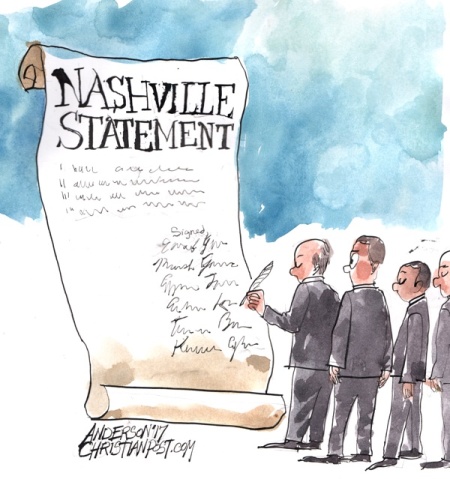250 Dutch Christians sign Nashville Statement; prosecutors to decide if declaration breaks law

The Nashville Statement affirming belief in traditional Christian sexual ethics is under investigation by prosecutors in the Netherlands after over 250 Dutch Christian leaders signed the statement of faith.
The manifesto was initially unveiled in August 2017 and has been signed by over 22,000 Christian leaders in the United States. The Nashville Statement stresses that marriage is the “covenantal, sexual, procreative, lifelong union of one man and one woman.”
The statement, which is spearheaded by the Council on Biblical Manhood and Womanhood, adds that “it is sinful to approve of homosexual impurity or transgenderism.”
Although the statement was unveiled a year-and-a-half ago, hundreds of Dutch Christian leaders and politicians, including the leader of the fundamentalist Christian party SGP, signed the statement on Jan. 5 after the document was translated into Dutch.
According to the Dutch daily Trouw, the Dutch signatories are all men and come from either the Restored Reformed Church, the Reformed Congregations or the Protestant Church in the Netherlands.
Two of the most notable signatories include SGP leader and parliament member Kees van der Staaij and SGP senator Diederik van Dijk.
As Dutch LGBT activists have spoken out against the Nashville Statement, the Public Prosecution Service is reportedly reviewing the statement to see if it breaks Dutch law in any way.
Additionally, pro-LGBT opera singer Francis van Broekhuizen filed a formal police complaint against van der Staaij, claiming that the Nashville Statement is a “call [for] discriminating against [LGBT] people."
The Netherlands became the first country in the world to legalize same-sex marriage in 2001. But as Dutch News points out, the Netherlands also has a large community of fundamentalist Christians who oppose same-sex marriage.
The pro-LGBT group COC Netherlands called the statement a “damaging document.” The organization claimed that those who signed the statement engaged in a “merciless and insensitive action.”
COC Netherlands called on both the SGP and Netherland’s Christian Union party to distance themselves from the statement.
While the head of the Christian Union has distanced himself from the statement, the SGP head has reaffirmed his support for the statement.
“The Nashville statement reflects the classic Christian notions on relationships and sexuality on an up-to-date and much-discussed theme. These notions are shared across borders of churches and countries,” van der Staaij said in a statement responding to critics. “The SGP has never made it a secret of the biblical notions about marriage, family and sexuality. In line with this, I have indicated that I can agree with the scope of the Nashville declaration.”
Van der Staaij continued by stating that he believes that the afterword found in the Dutch version of the Nashville Statement is “particularly valuable.” “It rightly emphasizes the great responsibility for careful handling with people who have probing questions about their sexual orientation and gender,” he explained. “These notions are an essential addition to the statement for me.”
Gert-Jan Segers, party leader of the Christian Union, explained in a Facebook post why he couldn’t sign the declaration.
“I did not sign the Nashville statement because I am afraid that the conversation about faith and homosexuality has not been served with this statement,” he wrote, according to an English translation of the post. “The talk about that is important, touches people and therefore — whatever your view is — is respectful and open. I also do not see how gays - inside and outside the church — are helped with this statement.”
“Jesus' first message for this world is not a list of do's and DON'TS, but a cordial invitation that makes it clear that everyone is welcome to him,” Segers added. “Whoever you are. I hope that as Christians in our society we do not first show a lifted finger, but above all a listening ear and a helping hand.”
According to Noordhollands Dagblad, at least one Dutch leader, Rev. Wilco Veltkamp, has voiced his regret for signing the statement and had his name withdrawn from the document.
“I have taken back the signing and regret that things have been run like this,” Wilco was quoted as saying.
In the U.S., the Nashville Statement was signed by prominent conservative evangelical pastors including Denny Burk, John Piper, Francis Chan, James Dobson, Karen Swallow Prior, R.C. Sproul, and others.
In August 2018, a number of signatories of the statement reaffirmed their support at a symposium marking the first anniversary of the initial signing.
"Long before anyone was debating gay marriage, there was a softening of marriage norms among evangelical Christians. Many evangelical congregations and ministries have acquiesced to divorce culture, pornography use, sexual immorality, and lack of church discipline," Burk said. "Because of this erosion of evangelical integrity on issue of sexual morality, it was past time for evangelicals to get their own house in order. Evangelicals needed to recover and reassert what Christ's Church has always believed. And that is why we drafted the Nashville Statement when we did."
But not all U.S. pastors were on board with the statement. Some argued that while they agreed with the biblical view of sexuality and gender, they disagreed with the approach, arguing that it lacked pastoral wisdom and further alienated LGBT persons.
Follow Samuel Smith on Twitter: @IamSamSmith
or Facebook: SamuelSmithCP





















